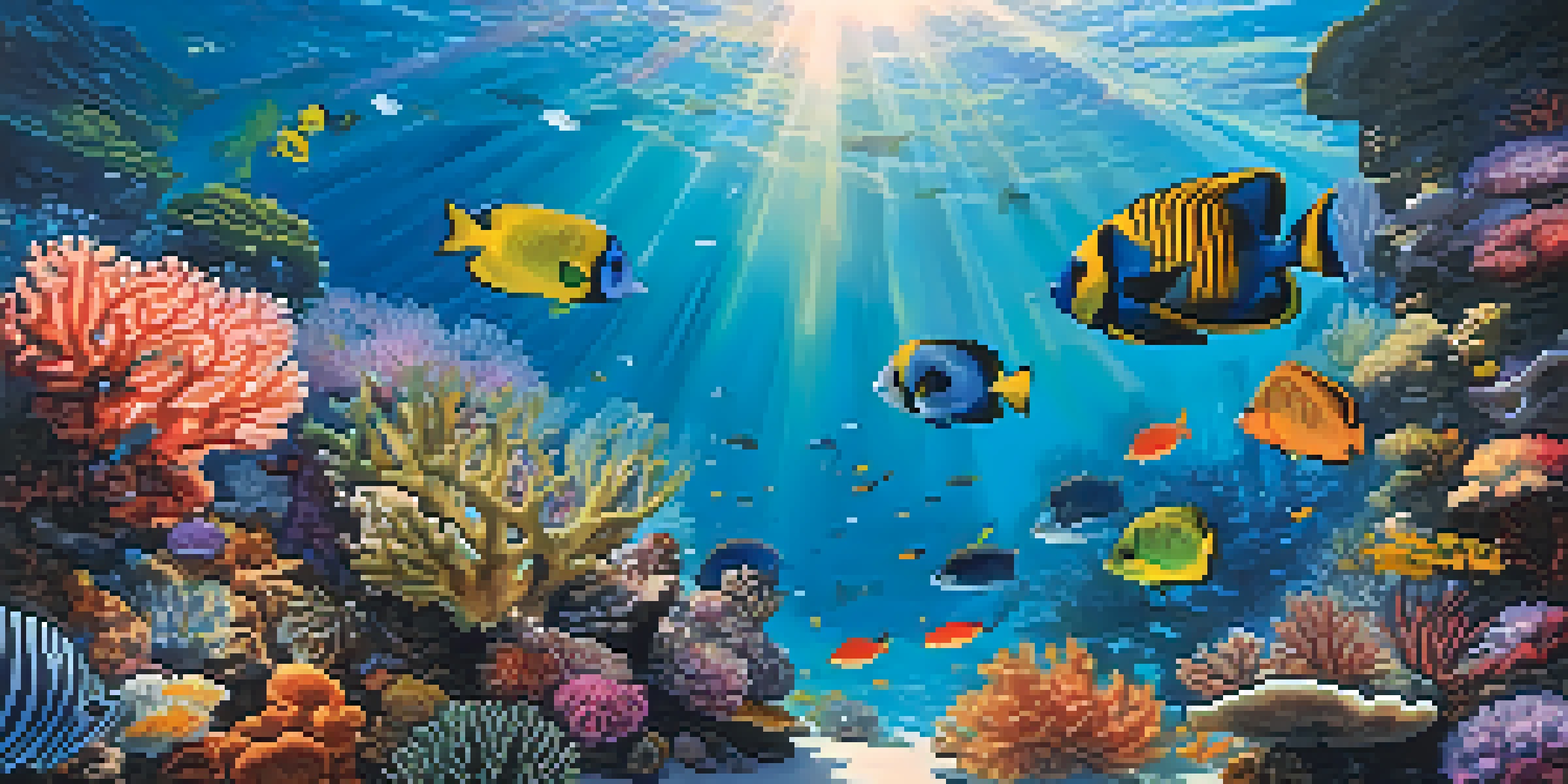Conservation Initiatives for Marine Life in Thailand's Waters

The Importance of Marine Conservation in Thailand
Thailand's waters are a biodiversity hotspot, home to numerous species of fish, corals, and other marine organisms. Protecting this delicate ecosystem is vital not just for the environment but also for local communities that rely on marine resources for their livelihoods. Without conservation efforts, many species face the threat of extinction, which could disrupt the balance of marine life and the economy.
The ocean is a central piece of our life support system. It is the most important resource we have on this planet. Protecting it is not just an option; it’s a necessity.
The impact of overfishing, pollution, and climate change has put immense pressure on these marine ecosystems. For instance, coral reefs, often referred to as the 'rainforests of the sea,' provide essential habitats for countless marine species yet are rapidly declining. By focusing on marine conservation, we can help ensure the survival of both these ecosystems and the communities that depend on them.
Moreover, marine conservation is not just about protecting fish or coral; it's also about preserving cultural heritage. Many coastal communities have deep-rooted traditions linked to the sea. Therefore, conservation initiatives can help maintain these traditions while promoting sustainable practices.
Key Marine Conservation Initiatives in Thailand
Thailand has implemented several key initiatives aimed at conserving its marine life. One of the most significant is the establishment of marine protected areas (MPAs), which restrict human activities in certain regions to allow ecosystems to recover. These MPAs serve as safe havens for diverse marine species, helping to replenish fish stocks and protect sensitive habitats.

Another vital initiative is the promotion of sustainable fishing practices. By educating local fishermen on sustainable techniques and providing incentives for responsible fishing, Thailand aims to reduce overfishing and encourage the recovery of depleted fish populations. This approach not only helps protect marine ecosystems but also ensures the long-term viability of fishing as a livelihood.
Biodiversity is Crucial for Economy
Protecting Thailand's marine biodiversity is essential not only for the environment but also for the livelihoods of local communities that depend on these resources.
Additionally, community-based conservation programs empower local residents to take an active role in protecting their marine environment. By involving communities in decision-making and providing training, these initiatives foster a sense of ownership and responsibility towards marine resources.
The Role of NGOs in Marine Conservation
Non-governmental organizations (NGOs) play a crucial role in marine conservation efforts in Thailand. They often spearhead projects aimed at protecting marine biodiversity, conducting research, and advocating for policy changes. For instance, organizations like the Thai Marine Conservation Group work tirelessly to raise awareness about the importance of marine ecosystems and the threats they face.
We won't have a society if we destroy the environment.
Through collaboration with local communities, government agencies, and international partners, NGOs can implement effective conservation strategies. They often engage in beach clean-ups, coral restoration projects, and educational campaigns to foster a culture of conservation. These initiatives not only help improve the health of marine environments but also build community resilience.
Moreover, NGOs serve as a bridge between scientists and local communities, translating complex research findings into actionable strategies. This collaboration ensures that conservation efforts are grounded in science while being culturally appropriate and beneficial to local populations.
Challenges Facing Marine Conservation in Thailand
Despite ongoing efforts, marine conservation in Thailand faces several challenges. One of the most pressing issues is the relentless threat of pollution, particularly plastic waste, which has become a significant problem in marine environments. This pollution not only harms marine life but also poses risks to human health as toxins accumulate up the food chain.
Moreover, illegal fishing practices continue to undermine conservation initiatives. Overfishing and destructive fishing methods, such as blast fishing, can decimate fish populations and damage fragile habitats. Enforcing regulations and penalties against illegal fishing is crucial to protect marine biodiversity effectively.
Effective Conservation Requires Community
Engaging local communities in conservation efforts leads to more sustainable practices and a deeper understanding of the importance of marine ecosystems.
Climate change also presents a formidable challenge, causing rising sea temperatures and ocean acidification. These changes can lead to coral bleaching and disrupt the breeding patterns of marine species. Addressing climate change requires a coordinated global effort, making local initiatives just one part of the broader solution.
Success Stories in Marine Conservation
There are numerous success stories in marine conservation across Thailand that demonstrate the effectiveness of targeted initiatives. For example, the restoration of coral reefs in Koh Tao has been a remarkable achievement. Through community-driven efforts, local divers have planted coral fragments and monitored their growth, leading to a resurgence in marine life and healthier reef ecosystems.
Another inspiring case is the resurgence of fish populations in designated marine protected areas. Studies have shown that these areas often see a significant increase in fish biomass, benefitting both the environment and local fisheries. This positive trend encourages further investment in marine conservation and helps to change public attitudes towards sustainable practices.
These success stories not only highlight the potential for effective conservation but also inspire other regions to adopt similar strategies. By showcasing tangible benefits, they can help garner support from the public and policymakers alike, emphasizing that marine conservation is both an ecological necessity and a viable path for sustainable development.
Community Engagement in Conservation Efforts
Community engagement is a fundamental aspect of successful marine conservation initiatives in Thailand. By involving local residents in the planning and implementation of conservation projects, these efforts are more likely to be effective and sustainable. Communities are often the best stewards of their local environments, having a deep understanding of the ecosystems they depend on.
Educational programs play a vital role in building awareness and encouraging community participation. Workshops, school programs, and outreach campaigns help educate residents about the importance of marine conservation and the actions they can take to contribute. When people understand the value of their natural resources, they are more likely to protect them.
Technology Enhances Conservation Efforts
Incorporating technology, such as drone surveillance and satellite mapping, can provide valuable insights and improve the effectiveness of marine conservation strategies.
Furthermore, fostering a sense of community pride in local marine environments can lead to grassroots movements advocating for conservation. When residents see the direct benefits of a healthy marine ecosystem—such as increased fish populations and cleaner beaches—they become motivated to sustain these efforts for future generations.
The Future of Marine Conservation in Thailand
The future of marine conservation in Thailand will depend on continued collaboration among stakeholders, including government, NGOs, and local communities. By working together, these groups can create comprehensive policies that address the myriad challenges facing marine ecosystems. This collaboration is essential to implement effective conservation strategies that are adaptable to changing environmental conditions.
Additionally, incorporating technology can enhance conservation efforts. Innovations such as drone surveillance for monitoring fishing activity and satellite mapping for tracking coral health can provide valuable data to inform decision-making. Embracing new technologies can strengthen existing initiatives and open up new avenues for conservation.

Ultimately, the success of marine conservation in Thailand hinges on a collective commitment to protecting these vital ecosystems. By fostering a culture of sustainability and awareness, Thailand can set an example for marine conservation efforts globally, proving that it is possible to balance economic development with environmental stewardship.